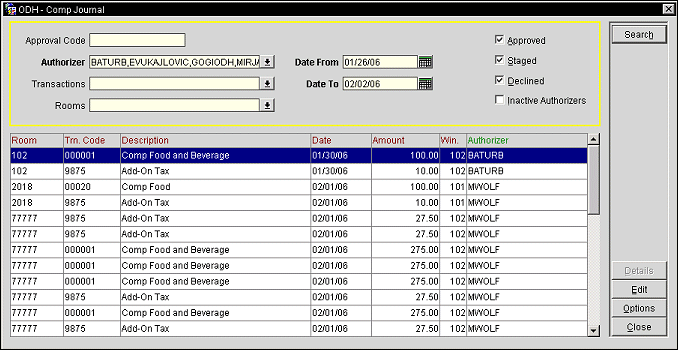
Comp Journal
The Comp Journal feature provides summary and detail information on all transactions that have been routed or transferred to the comp windows (101...108). This feature is available when the Comp Accounting license (OPP_GCA) is active.
When one of the Gaming Interface licenses (OPX_GA2, OPX_ACRS, OPX_BALL, etc.) is active, you can use this feature to determine which transactions were approved by the PTS and which transactions the PTS "staged" (did not approve). Staged transactions can be re-submitted to the PTS for approval, or they can be transferred to another of the guest's Billing screen windows or to another room. In addition, for any transaction you can access the Edit Transaction Details screen; this screen provides details such as price, quantity, cashier ID, supplemental and reference information, posting window, and other information related to the transaction. See Edit Transaction Details for an explanation of the information found on the Edit Transaction Details screen and the functions you can access from that screen.
To access the Comp Journal screen, select Comp Accounting > Comp Journal. The Comp Journal screen appears.
Note: The CASHIERING > BYPASS CASHIER LOGIN application parameter can be used to speed access to cashiering functions for users having a cashier ID associated with their user ID. If the CASHIERING > BYPASS CASHIER LOGIN application parameter is set to Y, and if you have previously logged in to cashiering and the cashier is still open, the Cashier Login screen does not appear when subsequently accessing cashiering functions. If Bypass Cashier Login is set to N (the default), you are prompted for a Cashier Login each time a cashiering function is accessed.

Approval Code. Enter the approval code assigned by the PTS to an approved transaction.
Authorizer. Select the down arrow to display a list of authorizers. Choose the authorizers whose comp transactions you want to review in the comp journal. If the Inactive Authorizers check box is selected, then inactive authorizers are displayed in the list of values for this field.
Transactions. Select the down arrow to display the List of Transaction Codes. Select transaction codes to review in the comp journal.
Rooms. Select the down arrow to choose from a list of room numbers. Multiple rooms can be selected.
Date From/Date To. Use the calendar tools to select the range of dates to review transactions. Or, you can enter dates manually. The default date range is the seven-day period immediately preceding and including the current date.
Approved. Select this check box to see transactions that were approved by the PTS. (Available when PTS interface license code is active.)
Staged. Select this check box to see transactions that are staged by the PTS. (Available when PTS interface license code is active.)
Note: When Staged is selected and Approved is not selected, the display shows both staged and non-approved transactions. Non-approved transactions are those that are neither staged, nor declined, nor approved.
Declined. Select this check box to display transactions that were declined by the PTS. (Available when PTS interface license code is active.)
Inactive Authorizers. Select this check box to display inactive authorizers in the Authorizers list of values.
Room. The guest room.
Trn. Code. The transaction code.
Description. The transaction code description.
Date. The date when the transaction was posted.
Amount. The amount of the comp transaction.
Authorizer. The OPERA user ID belonging to the authorizer of the transaction.
Approval. The approval code for an approved transaction. This code is assigned by the PTS.
Status. The comp status of the transaction.
Submit. The Submit button is available only when at least 1 of the gaming interface licenses (OPX_<version number>) under OXI license group is active. If the highlighted transaction has been staged (regardless of reservation status), submit the transaction to the PTS for approval. This button is not available if the highlighted transaction has already been approved.
Note: Staged generates are not approved automatically upon submission and approval of the main transaction. The generates for approval can be submitted separately/individually to the gaming system. If any of the generates are not approved (i.e., staged), and if the COMP ACCOUNTING > STAGED TRANSACTIONS DURING CHECKOUT application setting = Move, then upon check out, the generates and the approved main transaction are moved back to the guest window (1-8) as long as the check number is the same for the main and staged generates. Also, a Void/Delete business event is generated for the gaming system to credit the points back to the guest. Similarly, if the main transaction is staged and any generates were approved, then upon check out, the same action as above occurs.
Details. Highlight a transaction whose Status is Staged and select the Details button to open the Pending Transactions screen. This view-only screen lists the system messages that define why the transaction is staged along with the system code for the action and the date and time. When the transaction is approved, all messages are deleted from this screen.
Edit. Highlight a transaction and select the Edit button to display the Edit Transaction Details screen for the transaction. See Edit Transaction Details for further information.
Options. The Options menu gives you fast access to frequently used functions. Highlight the guest record to access these options and select the Options button. The following choices are available:
See Also